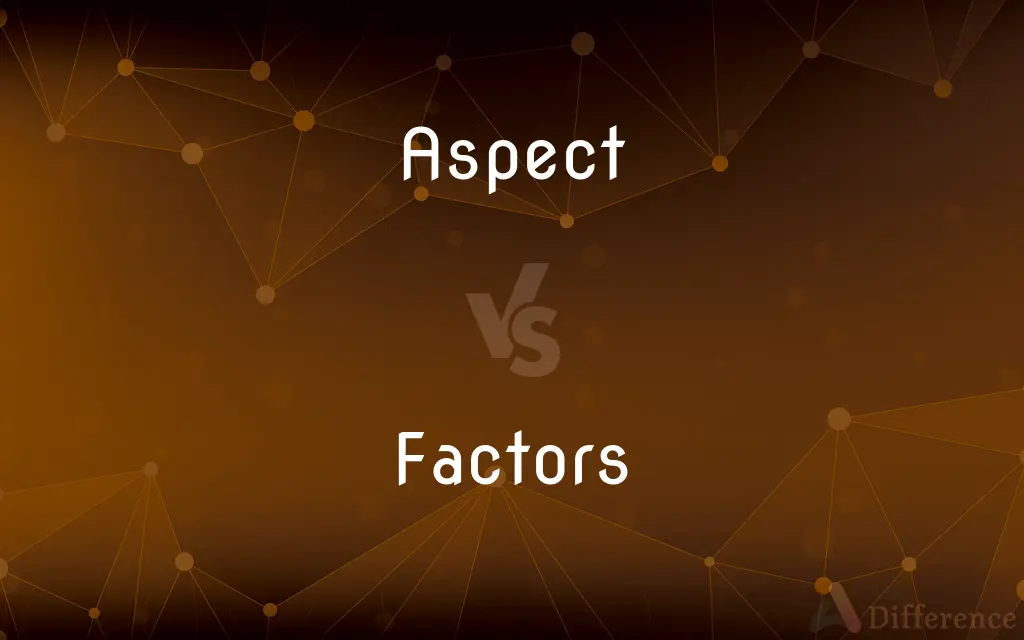Aspect vs. Factors — What's the Difference?
By Tayyaba Rehman & Maham Liaqat — Updated on April 1, 2024
Aspects refer to different features or dimensions of something, while factors are elements that contribute to or influence an outcome.

Difference Between Aspect and Factors
Table of Contents
ADVERTISEMENT
Key Differences
Aspects are used to describe the various characteristics or dimensions of a subject, idea, or object, highlighting the multiple ways it can be viewed or analyzed. Factors, on the other hand, specifically refer to elements or components that actively influence or determine outcomes.
When discussing a project's success, its aspects might encompass its scope, goals, and methodologies—broadly categorizing its features. Factors affecting the project's success, however, would include specific elements such as team expertise, resource allocation, and stakeholder support, which directly influence the outcome. This distinction underscores the difference between describing something's characteristics (aspects) and identifying elements that affect results (factors).
In scientific research, the aspects of a study might refer to its objectives, methodology, and theoretical framework, outlining the structure and focus of the investigation. Conversely, the factors in a study often pertain to the variables or conditions being examined for their effect on the research outcome, highlighting the investigatory focus on influence and causation.
Understanding the difference between aspects and factors is crucial in analytical and decision-making processes. While aspects provide a comprehensive view of a subject by detailing its various characteristics, factors zero in on the elements that have a direct impact on outcomes, guiding targeted interventions and strategies.
Comparison Chart
Definition
Different features or dimensions of something.
Elements that contribute to or influence an outcome.
ADVERTISEMENT
Implication
Broad, multifaceted examination without implying causality.
Implies causality or impact on outcomes.
Use Cases
Describing characteristics or perspectives.
Identifying elements that affect results.
Examples
Historical background, impact, future consequences of a social issue.
Economic policies, cultural norms affecting a social issue.
Focus
On characteristics and dimensions.
On causality and influence.
Compare with Definitions
Aspect
Characteristic features.
One important aspect of the novel is its intricate plot structure.
Factors
Variables in equations.
In this equation, time and velocity are factors affecting distance.
Aspect
Facets or sides.
The project was reviewed in all its aspects to ensure comprehensiveness.
Factors
Causes and influences.
Economic policy and consumer confidence are factors that influence economic growth.
Aspect
Components of a whole.
The different aspects of the marketing strategy were analyzed.
Factors
Determinants of outcomes.
Study habits and classroom engagement are key factors in student success.
Aspect
Multidimensional analysis.
The aspects of cultural diversity include traditions, languages, and values.
Factors
Influencing elements.
Weather and terrain are critical factors in agricultural productivity.
Aspect
Perspectives and angles.
We explored various aspects of the problem during the discussion.
Factors
Contributory components.
High demand and limited supply are factors driving the market's prices.
Aspect
A particular part or feature of something
The financial aspect can be overstressed
Personal effectiveness in all aspects of life
Factors
One that actively contributes to an accomplishment, result, or process
"Surprise is the greatest factor in war" (Tom Clancy).
Aspect
The positioning of a building or other structure in a particular direction
A greenhouse with a southern aspect
Factors
One who acts for someone else; an agent.
Aspect
A category or form which expresses the way in which time is denoted by a verb
Four verbal aspects
The semantics of tense and aspect
Factors
One who purchases accounts receivable at a discount.
Aspect
(of a planet) form an aspect with (another celestial body)
The sun is superbly aspected by your ruler Mars on the 19th
Factors
(Mathematics) One of two or more quantities that divides a given quantity without a remainder. For example, 2 and 3 are factors of 6; a and b are factors of ab.
Aspect
A way in which something can be viewed by the mind
Looked at all aspects of the situation.
Factors
A quantity by which a stated quantity is multiplied or divided, so as to indicate an increase or decrease in a measurement
The rate increased by a factor of ten.
Aspect
A characteristic or feature of something
A novel with many unusual aspects.
Factors
A gene. No longer in technical usage.
Aspect
A particular look or facial expression; mien
"He was serious of aspect but wholly undistinguished" (Louis Auchincloss).
Factors
(Physiology) A substance that functions in a specific biochemical reaction or bodily process, such as blood coagulation.
Aspect
Appearance to the eye, especially from a specific vantage point
"many small unsightly hillocks ... that had the aspect of graves" (Edgar Allan Poe).
Factors
To determine or indicate explicitly the factors of
If you factor 70, you get 2, 5, and 7.
Aspect
A position facing or commanding a given direction; exposure
A building with a southern aspect.
Factors
To engage in purchasing accounts receivable at a discount.
Aspect
A side or surface facing in a particular direction
The ventral aspect of the body.
Factors
Plural of factor
Aspect
The configuration of the stars, constellations, or planets in relation to one another.
Aspect
This configuration, thought by astrologers to influence human affairs.
Aspect
A property of verbs in which the action or state is related to the passage of time, especially in reference to completion, duration, or repetition.
Aspect
A set or category of verb forms indicating such a relation.
Aspect
(Archaic) An act of looking or gazing.
Aspect
Any specific feature, part, or element of something.
Japan's aging population is an important aspect of its economy.
Aspect
The way something appears when viewed from a certain direction or perspective.
Aspect
The way something appears when considered from a certain point of view.
Aspect
A phase or a partial, but significant view or description of something.
Aspect
One's appearance or expression.
Aspect
Position or situation with regard to seeing; that position which enables one to look in a particular direction; position in relation to the points of the compass.
The house has a southern aspect, i.e. a position which faces the south.
Aspect
Prospect; outlook.
Aspect
(grammar) A grammatical quality of a verb which determines the relationship of the speaker to the internal temporal flow of the event which the verb describes, or whether the speaker views the event from outside as a whole, or from within as it is unfolding.
Aspect
(astrology) The relative position of heavenly bodies as they appear to an observer on earth; the angular relationship between points in a horoscope.
Aspect
The personified manifestation of a deity that represents one or more of its characteristics or functions.
Aspect
(obsolete) The act of looking at something; gaze.
Aspect
(obsolete) Appearance to the eye or the mind; look; view.
Aspect
(programming) In aspect-oriented programming, a feature or component that can be applied to parts of a program independent of any inheritance hierarchy.
Aspect
(rail) The visual indication of a colour light (or mechanical) signal as displayed to the driver. With colour light signals this would be red, yellow or green.
Aspect
To have a particular aspect or type of aspect.
Aspect
(Wicca) To channel a divine being.
Aspect
(obsolete) To look at.
Aspect
The act of looking; vision; gaze; glance.
His aspect was bent on the ground.
Aspect
Look, or particular appearance of the face; countenance; mien; air.
[Craggs] with aspect open shall erect his head.
Aspect
Appearance to the eye or the mind; look; view.
The true aspect of a world lying in its rubbish.
Aspect
Position or situation with regard to seeing; that position which enables one to look in a particular direction; position in relation to the points of the compass; as, a house has a southern aspect, that is, a position which faces the south.
Aspect
Prospect; outlook.
This town affords a good aspect toward the hill from whence we descended.
Aspect
The situation of planets or stars with respect to one another, or the angle formed by the rays of light proceeding from them and meeting at the eye; the joint look of planets or stars upon each other or upon the earth.
Aspect
The influence of the stars for good or evil; as, an ill aspect.
The astrologers call the evil influences of the stars evil aspects.
Aspect
A view of a plane from a given direction, usually from above; more exactly, the manner of presentation of a plane to a fluid through which it is moving or to a current. If an immersed plane meets a current of fluid long side foremost, or in broadside aspect, it sustains more pressure than when placed short side foremost. Hence, long narrow wings are more effective than short broad ones of the same area.
Aspect
To behold; to look at.
Aspect
A distinct feature or element in a problem;
He studied every facet of the question
Aspect
A characteristic to be considered
Aspect
The visual percept of a region;
The most desirable feature of the park are the beautiful views
Aspect
The beginning or duration or completion or repetition of the action of a verb
Aspect
The expression on a person's face;
A sad expression
A look of triumph
An angry face
Common Curiosities
What is an aspect?
An aspect refers to a distinctive feature or dimension of something, highlighting its multifaceted nature.
Why is it important to distinguish between aspects and factors?
Distinguishing between them is crucial for accurate analysis, strategic planning, and effective problem-solving, as it clarifies what merely describes a situation versus what influences it.
What is a factor?
A factor is an element that influences or contributes to an outcome, indicating causality or impact.
Do aspects and factors play a role in every analysis?
Yes, most forms of analysis will consider both to fully understand a subject's characteristics and the elements influencing it.
How do aspects and factors contribute to complexity?
They add complexity by expanding the breadth of what must be considered in understanding and addressing a subject or problem.
Can the same element be both an aspect and a factor?
Yes, depending on the context, the same element can serve as both, highlighting its characteristic (aspect) and its influence on outcomes (factor).
Can an aspect become a factor?
Yes, an aspect of a situation can also be a factor if it directly influences outcomes within that context.
How do aspects and factors relate in decision-making?
In decision-making, understanding the aspects of a situation helps outline its scope, while identifying factors guides towards impacting outcomes.
How are aspects and factors identified in research?
In research, aspects are identified through comprehensive analysis, while factors are determined through empirical testing and evidence of causality.
What is the role of factors in predictive models?
Factors are crucial in predictive models as they are variables that influence the predicted outcomes.
Can factors be controlled or manipulated?
Yes, in many cases, factors can be controlled or manipulated to achieve desired outcomes, especially in experimental settings.
Are aspects less important than factors?
Aspects are not necessarily less important; they provide essential context and understanding, while factors offer insights into causality and influence.
How do aspects and factors interact in systems thinking?
In systems thinking, aspects help describe the system, while factors are analyzed for their influence on system behavior and outcomes.
How does one prioritize factors over aspects?
Prioritizing factors over aspects depends on the goal—whether it's understanding a situation or influencing an outcome.
Can focusing too much on factors overlook important aspects?
Yes, overly focusing on factors can overlook broader aspects, potentially missing critical insights into the full nature of a subject.
Share Your Discovery

Previous Comparison
Escalator vs. Lift
Next Comparison
Aftcastle vs. ForecastleAuthor Spotlight
Written by
Tayyaba RehmanTayyaba Rehman is a distinguished writer, currently serving as a primary contributor to askdifference.com. As a researcher in semantics and etymology, Tayyaba's passion for the complexity of languages and their distinctions has found a perfect home on the platform. Tayyaba delves into the intricacies of language, distinguishing between commonly confused words and phrases, thereby providing clarity for readers worldwide.
Co-written by
Maham Liaqat













































